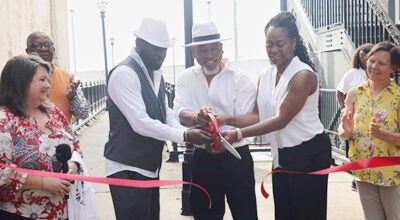Advisors tell rec panel to get public on board first
Published 11:36 am Wednesday, July 9, 2014
Know the competition, have a plan, get the residents on board and put the kids first.
Amid the drawings and photographs of sports complexes in Brandon and Vidalia, La., that advice was the best information members of Vicksburg’s ad hoc committee on recreation received this week during discussions with Vidalia’s recreation director and the architect working with Brandon officials on the revitalization of that city’s Shiloh Park renovation project.
Johnny Hoffpauir, Vidalia parks and recreation director, and Jamie Wier of Wier and Boerner Architecture of Jackson, which is doing the planning and design for Shiloh Park, are the first outside officials to discuss their recreation and sports complexes with the committee.
Committee chairman Omar Nelson said recreation officials from other areas of the state are expected to meet with the group to discuss how they upgraded facilities and developed new recreation complexes.
Hoffpauir and Wier discussed how their respective cities planned and funded the complexes, emphasizing the need to bring the residents and government officials together.
“You have to get the people involved,” Wier continued, “they have to feel they are a part of the process.”
“You have to make sure that the people know what you’re doing,” Hoffpauir said.
Both park projects are funded by tax revenue, the committee learned. The 80-acre Concordia Recreation District 3 park in Vidalia, is a joint venture between the city and Concordia Parish, Hoffpauir said, adding it is supported through a property tax levied by the recreation district, which is its own taxing entity.
The work at Shiloh, Wier said is supported by a 2 percent food tax in Brandon that was approved by 85 percent of the voters. The tax revenue, he said, is being used as the collateral to borrow the money for the park project, which encompasses 172 acres.
“It (the tax) had tremendous support,” he said, “because the mayor got the people involved. You have to tell people what they’re getting for the money. It was sold as ‘an investment for your kids.’”
Another aspect to emphasize, he said, is economic development.
“Tournaments are big, and people will go to cities with good facilities,” he said, adding, “families will spend $400 to $500 a weekend on hotel rooms and meals.”
The committee, however, balked at funding a complex with tax revenue, recalling the problems in 2012 when former mayor Paul Winfield proposed funding a sports complex using a sales tax.
“That was a disaster,” committee member Rowdy Nosser said. “It scared the people to death.” Winfield pushed for the tax without showing any plans or naming a site for the proposed park.
Before they planned their respective projects, Hoffpauir and Wien said, officials toured facilities in other communities to find out what other cities did and how they get the support for the projects.
Hoffpauir said he visited facilities in Mississippi and Louisiana. “I was surprised at how willing people were to talk about their programs,” he said.
“We went on a road trip,” Wier said, adding he joined Brandon Mayor Butch Lee and three aldermen on a tour of complexes in Mississippi and other states.
“We went from Mississippi to Elizabethtown, Ky.,” he said. “We asked people who have kids on ball teams where they traveled for tournaments. They told us, and we went to those places.”
He told the board to make sure any recreation complex “provides something for everyone. You’re going to have people who will oppose the complex because they don’t like change or because it is aimed at one group. You have to provide room for other activities.”
Wier said the facility in Elizabethtown, Ky., offered facilities for different activities, adding, “that park was an experience. You need to provide an experience for people so they will want to use the park.”
Both Vidalia and Shiloh offer facilities for other activities such as basketball courts and tennis courts. Wier said the improvements at Shiloh will also include walking tracks that could double as cross country courses. Brandon, he said, does not have a cross-country course, adding the Rankin County Invitational, a cross country meet for high schools, is held in Cleveland.
“Vicksburg with its hills could have a great cross country course,” he said. “Runners love a challenge.”
Nelson told Wier and Hoffpauir that the committee will hold public meetings in August and September, adding the committee wants to give local residents the opportunity to say “what they want and if they want fix what we have or build a new complex.”
The 11-member committee first met on June 5, and began discussions that indicated a move toward a multipurpose recreation complex, marking the third time a recreation complex for the city has been discussed.
In 2003, the city bought the 200-acre Fisher Ferry Road property near St. Michael Catholic Church for a sports complex for $325,000. The project was abandoned in 2009 after an additional $2.7 million had been spent for preliminary plans, engineering and dirt work. The city has spent $55,343 since August 2012 to replace the concrete in the drainage chutes on the site with riprap and grout under a Mississippi Department of Environmental Quality mandate. The board in March put the property up for sale for a 90-day period. Information about any possible interest was unavailable. Former mayor Winfield in 2012 promoted an estimated $20 million sports complex funded by a half-cent sales tax. Flaggs, who was a state legislator at the time, opposed the project because he said there were too many uncertainties with it. The project died when the chairman of the House Local and Private Committee refused to introduce the bill.





